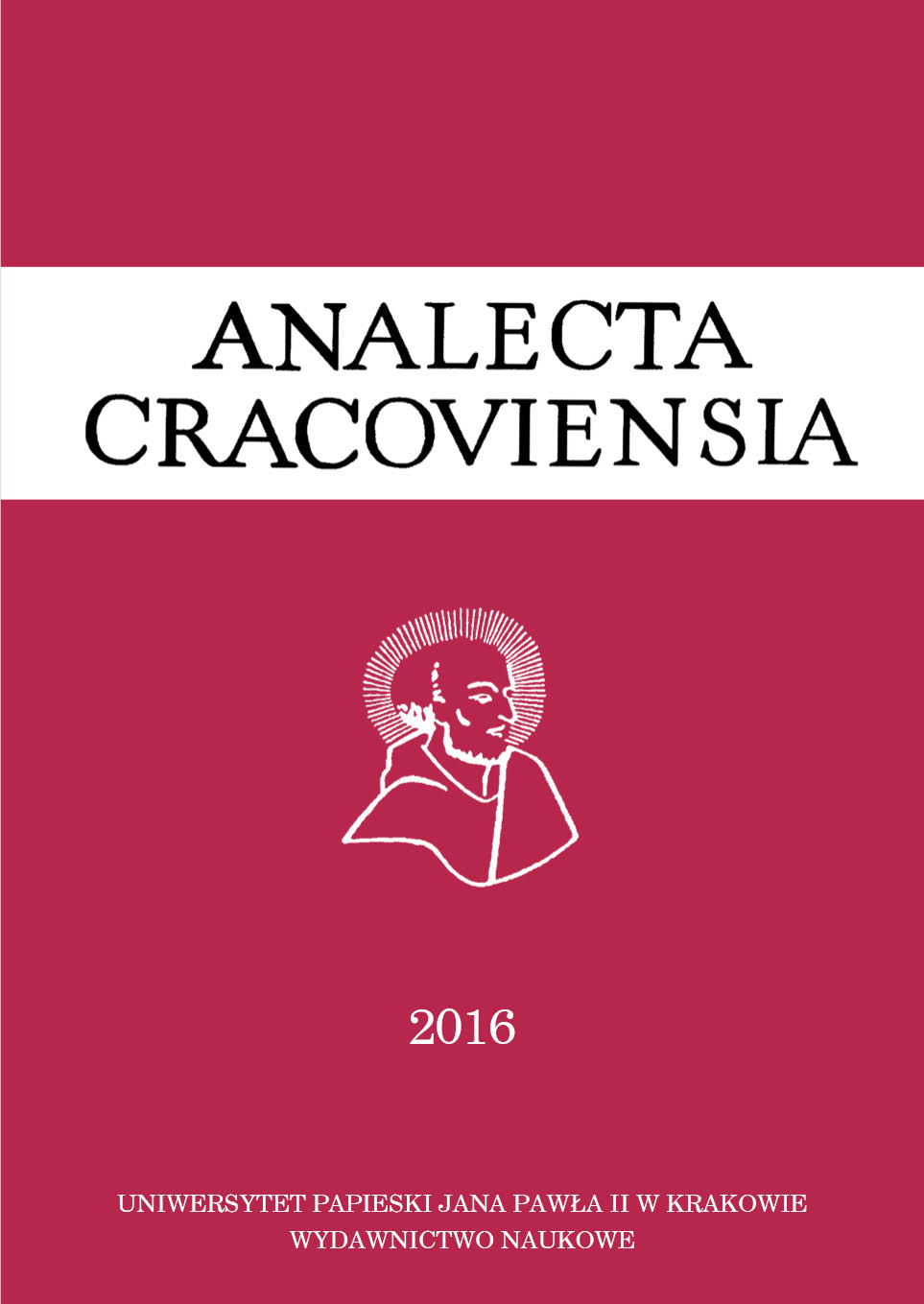The methods of unveiling the truth in the matrimonial nullity process by a judge
DOI:
https://doi.org/10.15633/acr.2029Keywords:
matrimonial nullity proces, objective truth, moral certitude, ecclesiastical judgeAbstract
The assumptions of the above article, according to “first things first” rule, is to briefly remind the superior value of the matrimonial nullity process which is the objective truth. While investigating the case the ecclesiastical judge has to achieve such truth through a variety of methods of the intellectual knowledge. The author indicates and compactly describes the criteria for the judge to accomplish the truth in the process such as moral certitude, free assessment of evidence and objectivity. In the article, the attention is focused on the personality of a judge as the researcher of justice. The publication cites some characteristics and attitudes that assist the judge in the preaching of the truth but can also – under some circumstances – weaken its objectivity. The main idea of this work stipulates that no pastoral reasons could impair the moral and legal requirement to achieve the material truth in the canonical matrimonial process. This fact is contained in the Code of Canon Law as the fundamental principle of salus animarum.References
Bonnet P. A., Le prove nel giudizio ecclesiale, „Periodica” 98 (2009), s. 235–273.
Brzemia-Bonarek A., Pomoc sądowa między sądami państwowymi a sądami kościelnymi. Analiza prawna zagadnienia i propozycje de lege ferenda, [w:] Sędzia i pasterz. Księga pamiątkowa z okazji 50-lecia pracy sądowej ks. Prof. Remigiusza Sobańskiego, red. H. Typańska, Katowice 2007, s. 41–53.
Burke R. L., Canon 1095. Canonical doctrine and jurisprudence, part 1: Canon 1095 § 1 and 2, [w:] Proceedings of the 45th Annual Convenction of CLSA, Washington 1984, s. 94–107.
Corriden J. A., Rules for interpreters, „The Jurist” 42 (1982), s. 277–303.
Gaudamet J., Storia del diritto canonico. Ecclesia et civitas, Milano 1998.
Grabowski M., Emocje i matematyka, [w:] Wiedza a uczucia. Filozoficzne problemy wiedzy, red. A. Motycka, Warszawa 2003.
Grocholewski Z., Pewność moralna jako klucz do lektury norm procesowych, „Ius Matrimoniale” 3 (1998) nr 9, s. 9–43.
Klonowski W., Chaosensologia. Fizykalistyczna teoria uczuć, [w:] Filozoficzne problemy wiedzy, t. 4: Wiedza a uczucia, red. A. Motycka, Warszawa 2003.
Llobell J., Oggettività e soggettività nelle valutazione giudiziaria delle prove, „Quaderni di diritto ecclesiale” 14 (2001), s. 394–413.
Longeran B., Insight. A study of human understanding, [w:] The collected works of Bernard Longeran, Toronto 1992.
Majer P., Kanon 1687 § 1 CIC/MIDI, [w:] Praktyczny komentarz do Listu apostolskiego „Mitis Iudex Dominus Iesus Motu proprio” papieża Franciszka, red. P. Skonieczny OP, Tarnów 2015, s. 184–192.
Pastwa A., Favor matrimonii i certitudo moralis (kan. 1608 § 4) – strukturalne filary teleologii procesu o nieważność małżeństwa, „Prawo Kanoniczne” 2011, nr 1–2, s. 217–245.
Rozkrut T., Dialog sędziego z biegłym w kanonicznym procesie małżeńskim, „Prawo Kanoniczne” 2011, nr 1–2, s. 161–174.
Rozkrut T., Kanon 1678 § 3 CIC/MIDI, [w:] Praktyczny komentarz do Listu apostolskiego „Mitis Iudex Dominus Iesus Motu proprio” papieża Franciszka, red. P. Skonieczny OP, Tarnów 2015, s. 111–114.
Skonieczny P., Ratio art. 12, [w:] Praktyczny komentarz do Listu apostolskiego „Mitis Iudex Dominus Iesus Motu proprio” papieża Franciszka, red. P. Skonieczny OP, Tarnów 2015, s. 156-159.
Sobański R., Uwagi o funkcji sędziego w procesie o nieważność małżeństwa, „Ius Matrimoniale” 3 (1998) nr 9, s. 45–61.
Sobański R., Iudex veritatem in matrimonio dicit, „Ius Matrimoniale” 4 (1999) nr 10, s. 169–197.
Sobański R., Uwagi o tożsamości sędziego kościelnego, „Prawo Kanoniczne” 45 (2002) nr 3–4, s. 2–22.
Sobański R., Prawda jako entelechia procesu o nieważność małżeństwa w świetle przemówień Piusa XII do Roty Rzymskiej, „Ius Matrimoniale” 13 (2008) nr 19, s. 29–41.
Tokarczuk R., Sprawiedliwość jako naczelna wartość prawa, „Państwo i Prawo” 1997, nr 6, s. 3–20.
Tourneau D. le, La protection de la vérité dans les discours de le Pape Jean Paul II à la Rote Romaine (1979–2005), „Forum Canonicum” 2 (2007) nr 1, s. 71–86.
Versaldi G., L’oggettivita delle prove in campo psichico, [w:] Richerche di Scienze Teologiche 19, Brescia 1981.
Zuanazzi G., Psichologia e psychiatria nelle cause matrimoniali canoniche, „Studii Giuridici” 73 (2006).
Downloads
Published
Issue
Section
License
The author declares that he owns the copyright to the work (article) and that it is not limited in the scope covered by the above declaration and that the work (article) is an original work and does not infringe the copyright of other persons.
The author allows the Pontifical University of John Paul II in Krakow to use the paper free of charge, non-exclusive and unlimited in time by, i.e.:
– keeping in records and reproduction of the copies of the work using printing, reprography, magnetic recording and digital technology;
– trade in the original or copies on which the work has been recorded (introduction to the market, lending or rental of the original or copies, public exhibition, display, as well as making the work available to the public in such a way that everyone can have access to it in a place and at a time chosen by them);
– inclusion of the work in a collective work;
– granting by the Pontifical University of John Paul II in Krakow a Creative Commons Sub-licence Authorship Recognition-Non-commercial Use-No Subsidiaries 3.0 Poland
The Pontifical University of John Paul II in Krakow makes the work available on the Magazine Platform of the university under the Creative Commons Attribution-Non-commercial Use-No Subsidiary Works 3.0 Poland license.
Thus, it entitles all interested parties to use the work under the following conditions:
- the author and the title of the work will be given,
- the place of publication (journal title and internet address of the originally published work) will be indicated,
- the work will be distributed in a non-commercial manner,
- no dependent works will be created.

